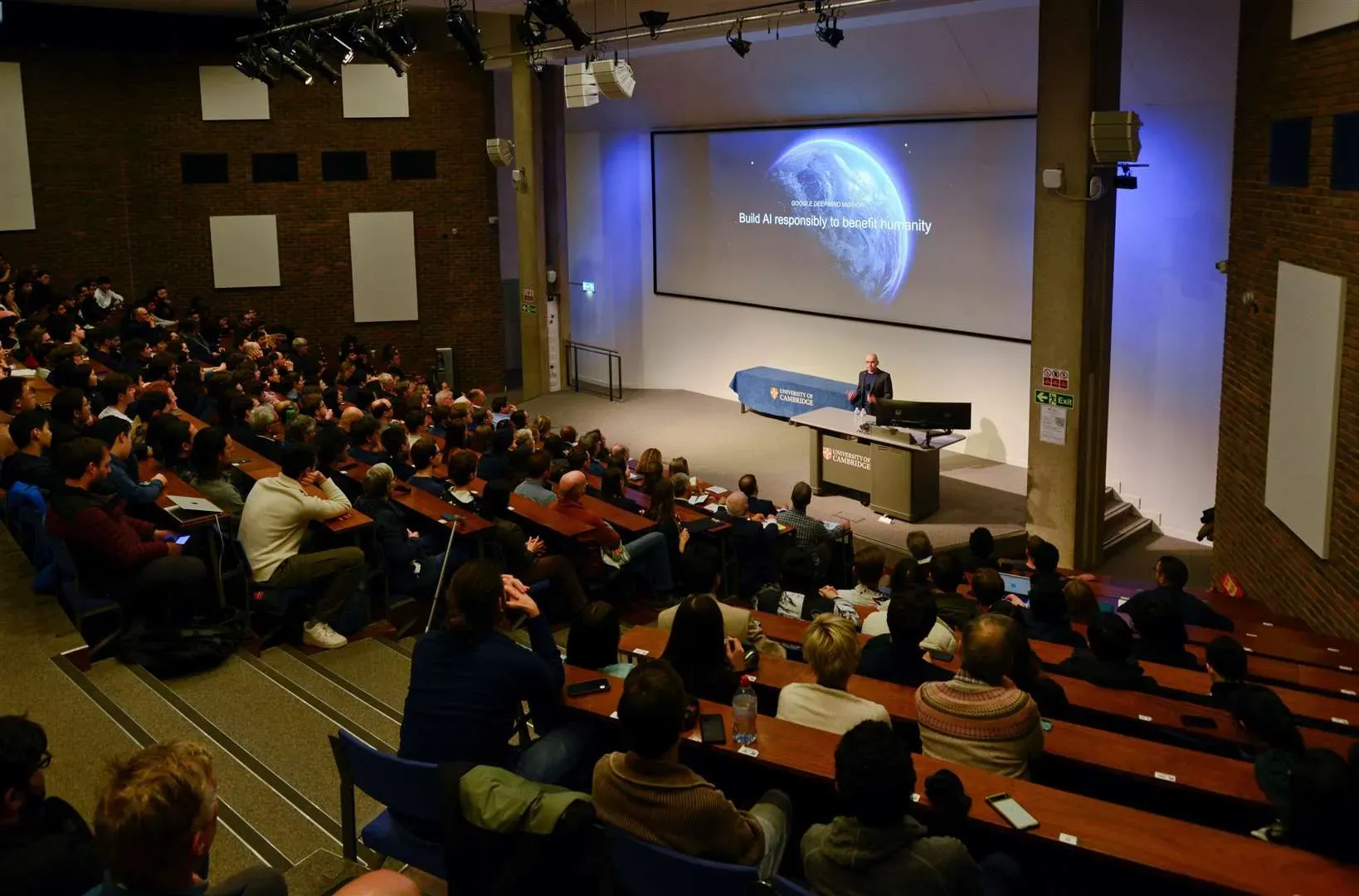Demis Hassabis has made headlines worldwide after being awarded the 2024 Nobel Prize in Chemistry, a recognition that highlights the remarkable advancements made in the realm of artificial intelligence, particularly through his groundbreaking work at DeepMind AI. Just moments before the announcement went public, Hassabis received a phone call that would change his life forever, confirming his innovative contributions to the scientific community. He, alongside colleague John Jumper, was lauded for the creation of AlphaFold, a revolutionary tool known for predicting protein structures—a feat previously deemed a monumental challenge in biology. This Nobel Prize not only showcases the significance of AI in science but also sparks discussions about the future of Artificial General Intelligence as a transformative force. As we stand at this crossroads of technological advancement, the potential impacts of AI and its implications for humanity raise critical questions that resonate on a global scale.
The recent recognition of Demis Hassabis with the Nobel Prize signifies a milestone in the integration of artificial intelligence into scientific achievement. As the mastermind behind DeepMind AI, Hassabis has spearheaded innovations like AlphaFold, which has redefined how scientists approach protein folding and related biology fields. His vision for AI encompasses hopes for Artificial General Intelligence (AGI) that could solve complex problems and advance our understanding of existence. This award opens a broader conversation on the implications of AI developments for future generations, emphasizing the necessity of responsibly harnessing technology. With the intersection of AI and pressing global challenges, the potential is immense, prompting an urgent exploration of how we shape the future of humanity.
Demis Hassabis and the 2024 Nobel Prize in Chemistry
Demis Hassabis, the pioneering CEO of Google DeepMind, was informed of his historic win of the 2024 Nobel Prize in Chemistry just moments before the announcement shocked the world. This Nobel honor is not only a personal triumph but a significant recognition of the contributions artificial intelligence can make to the scientific community. Hassabis shares how surreal the experience felt, noting that he would have preferred to avoid the chaotic possibility of learning about his achievement from a news broadcast. His citation of AlphaFold, the revolutionary AI tool developed by DeepMind, highlights a pivotal moment in the intersection of technology and science.
Winning such a prestigious accolade signals a transformative step for AI applications in research and development. Hassabis, alongside his collaborator John Jumper, received credit for designing AlphaFold, an AI capable of predicting protein structures from amino acid sequences. This breakthrough is compared to solving a longstanding ’50-year grand challenge’ in biology. The Nobel Prize itself offers hope that AI tools developed under Hassabis’s leadership may continue to receive acknowledgment in future scientific fields, paving the way for sustained innovation in chemistry and beyond.
AlphaFold: Transforming Biological Research
AlphaFold represents a monumental achievement not just for DeepMind but for the scientific community at large, ushering in a new era where studying protein structures is no longer a time-intensive endeavor. Scientists can now utilize this AI, drastically reducing the time required to model complex protein structures from years to mere hours. The impact of such efficiency can lead to rapid advancements in various fields, including vaccine development, cancer research, and climate science. The availability of AlphaFold as an open-source tool demonstrates not only DeepMind’s commitment to innovation but its dedication to democratizing access to cutting-edge scientific tools.
Despite its revolutionary potential, some critics argue that AlphaFold’s capabilities are limited, merely scratching the surface of what true artificial intelligence can achieve. While it excels at one specific task, the broader objective of creating an AI with comprehensive understanding and research capabilities remains unachieved. Hassabis dreams of an Artificial General Intelligence (AGI) that can not only replicate human problem-solving but also contextualize and understand the wider universe, ultimately leading to unprecedented scientific breakthroughs.
The Future of Artificial General Intelligence (AGI)
Demis Hassabis envisions AGI as a transformative technology that can redefine scientific inquiry and understanding. In contrast to contemporary AI, which is largely task-specific, AGI would possess the versatility to navigate complex problems across multiple domains, driving profound advancements in knowledge and societal progress. He lays out his timelines, predicting the emergence of AGI within the next decade—an aggressive forecast informed by the significant strides in AI development witnessed recently. Predictions from other industry leaders, however, show a range of timelines, highlighting the uncertainty surrounding AGI’s arrival.
The definition of AGI is crucial to understanding the implications of this technology; for Hassabis, it means developing systems capable of generating novel solutions and understanding. This differs starkly from business-oriented views that frame AGI as simply outperforming humans in economically viable tasks. The technical and ethical challenges involved in achieving this level of advancement are substantial, raising critical questions about how AGI systems might operate and the unforeseen consequences they could entail.
AI and the Future of Humanity: A Dual-Edged Sword
The development of AI technologies like AlphaFold and the pursuit of AGI carry with them both significant potential and substantial risks. As Demis Hassabis emphasizes, AI could fundamentally change how humanity approaches problems such as climate change, disease, and resource scarcity—offering solutions previously thought unattainable. However, these advancements also raise concerns regarding how they may be leveraged. The ethics of AI deployment, particularly in military contexts, pose a complex dilemma for innovators like Hassabis, especially as AI capabilities grow more sophisticated and widespread.
Navigating these dual-use technologies requires proactive measures and robust international collaboration. Hassabis is acutely aware of the shifting geopolitical landscape, noting the complications that arise from nations racing to harness AI’s full potential for national security while also ensuring responsible use. He stresses the need for agreements and frameworks to manage potential crises that autonomous systems could provoke, particularly as nations develop increasingly advanced AI technologies.
Navigating Ethical Challenges in AI Development
Hassabis’s journey underscores the ethical challenges inherent in AI development. His initial commitment to prevent the military application of DeepMind’s technologies demonstrates a profound regard for the potential consequences of AI. However, as he acknowledges, geopolitical tensions have prompted a reevaluation of this posture. The boundary between using AI for humanity’s benefit and enabling its use for violence raises pressing ethical questions that require continuous dialogue among researchers, policymakers, and the public.
The dilemma of ensuring AI serves humanity’s interests speaks to the broader implications of these technologies. As leading AI practitioners like Hassabis deepen their involvement in global discussions, it becomes crucial to address how AI technologies will align with democratic values and ethical governance frameworks. Without guiding principles in place, the promise of AI could become overshadowed by its misuse, forcing innovators to grapple with the reality of their creations.
The Commercial Promise of AI Technologies
The commercial landscape surrounding AI is experiencing revolutionary shifts, as industry players rush to harness AI’s potential in redefining labor, productivity, and innovation. Companies like Google are leveraging technologies such as Gemini and AlphaFold not only to enhance internal capabilities but also to reshape competitive markets. As AI systems mature, the race to secure a leading position on AI innovation becomes increasingly fierce, with significant implications for economies worldwide.
However, the automation of jobs raises concerns about the socio-economic consequences of AI deployment. While businesses stand to reap immense rewards, everyday workers may face displacement and disruption. Demis Hassabis’s insistence on ethical stewardship becomes ever more critical as we navigate these transformations in labor and industry. As AI continues to mature, the challenge will be to balance the motivations of profit with the needs of society to ensure that advancements benefit humanity at large.
Geopolitical Implications of AI Development
As nations become increasingly aware of AI’s potential, the geopolitical implications of its development are emerging as a central concern. The race to develop AGI and advanced AI systems has become a focal point of national strategy, with governments competing to maintain technological superiority amid growing tensions. Hassabis articulates the urgency of international cooperation in addressing the ethical and safety challenges posed by AI, emphasizing that such collaboration should transcend political disagreements to promote overall human progress.
Efforts by policymakers to regulate AI technology, including export controls on AI chips, underline the stakes involved. As countries vie for dominance in AI capabilities, especially between global giants like the U.S. and China, the potential for conflict escalates. Hassabis’s advocacy for dialogue and cooperation highlights a vision where nations prioritize collective safety over rivalry—an approach that recognizes the interconnectivity of AI advancements and their universal ramifications.
Preparing Society for an AI-Driven Future
The advent of powerful AI systems presents an immediate challenge: preparing society to adapt and thrive amid transformative changes. For individuals to succeed in a landscape increasingly defined by AI, there needs to be a concerted effort to educate and equip people with the skills to interact effectively with new technologies. Hassabis expresses concern that without proactive strategies for adapting to automation and AI enhancements, significant portions of the population may find themselves unprepared for the future.
In the context of potential AGI, new socio-economic structures may be necessary to address the implications of a labor market defined by automation. Possibilities such as universal basic income, the redefinition of work, and new political philosophies could emerge to ensure that societal benefits are equitably distributed as AI technologies advance. Preparing for such shifts will require input from economists and social scientists alike, together with technologists and visionaries like Hassabis, to ensure that humanity captures the benefits of these groundbreaking developments.
The High Stakes of Demis Hassabis’s Vision for AI
In sum, Demis Hassabis’s aspirations for AI are both ambitious and fraught with complexity. With the world standing on the precipice of AGI, the stakes have never been higher, as the decisions made now will shape the trajectory of humanity’s relationship with technology for generations. The Nobel Prize award is just one of many milestones in this journey, accompanied by ethical decisions that challenge conventional thinking about AI’s future.
As Hassabis strives to navigate the competitive landscape of AI development, balancing idealism with pragmatism will be essential. The promise of AI-driven abundance and scientific advancement teeters on the edge of ethical concerns and potential misuse. Ultimately, the future shaped by AGI, whether utopian or dystopian, depends on the direction and stewardship taken by leaders in the field—like Demis Hassabis—whose visions will determine AI’s role in the next chapter of human existence.
Frequently Asked Questions
What did Demis Hassabis win the 2024 Nobel Prize in Chemistry for?
Demis Hassabis won the 2024 Nobel Prize in Chemistry for his groundbreaking work with AlphaFold, an AI tool developed by Google DeepMind that predicts the 3D structure of proteins from their amino acid sequences. This achievement addresses a long-standing challenge in biology and has significantly advanced scientific research globally.
How has AlphaFold contributed to the field of scientific research?
AlphaFold has revolutionized scientific research by enabling researchers to model protein structures in hours instead of years. Released for free by Google DeepMind, its applications range from developing malaria vaccines to advancing cancer research, showcasing the importance of AI in the future of humanity and healthcare.
Why is the 2024 Nobel Prize in Chemistry significant for AI?
The 2024 Nobel Prize in Chemistry is significant for AI as it is the first time that an artificial intelligence contribution has been recognized at such a prestigious level. Demis Hassabis and John Jumper’s work with AlphaFold highlights the transformative potential of AI technologies, positioning them as vital tools in modern scientific endeavors.
What are Demis Hassabis’s predictions regarding Artificial General Intelligence (AGI)?
Demis Hassabis predicts that Artificial General Intelligence (AGI) could be achieved within five to ten years. He envisions AGI not only solving existing problems but also generating new scientific insights, transforming industries, and potentially reshaping society for the better.
What challenges does AI pose in the context of AGI development?
The development of AGI presents significant challenges, including the risk of misuse by malicious actors, ensuring alignment with human values, and maintaining control over increasingly autonomous AI systems. Demis Hassabis emphasizes the need for rigorous testing and international cooperation to mitigate these risks.
How does Demis Hassabis view the relationship between AI advancements and society’s future?
Demis Hassabis believes that advancements in AI, including the potential of AGI, could lead to a future where many societal issues, such as disease and climate change, are resolved. He envisions a world where technology facilitates resource abundance and improves quality of life, though he acknowledges the ethical complexities and responsibilities that accompany this development.
What ethical concerns surround Demis Hassabis’s vision for AI and AGI?
Ethical concerns in Demis Hassabis’s vision for AI and AGI include the potential for militarization of AI technologies, the need for careful regulation to prevent harmful uses, and the economic implications of automation on the workforce. These issues highlight the necessity for responsible AI development that prioritizes human welfare and democratic values.
In what ways has DeepMind’s research influenced the future of AI technology?
DeepMind’s research, particularly through initiatives like AlphaFold, has significantly influenced the AI landscape by demonstrating the capabilities of AI in solving complex scientific problems. Hassabis’s leadership continues to push for advancements that may lead to AGI, promising revolutionary changes in various fields and enhancing our understanding of the natural world.
What is the significance of the Nobel Prize for future AI developments?
The recognition of AI through the Nobel Prize underscores the growing importance of artificial intelligence in scientific advancements. It sets a precedent for future AI innovations to be acknowledged as crucial contributions to human knowledge, encouraging further investment and research in the field.
What does Hassabis believe about the economic impacts of AGI?
Hassabis foresees that AGI could create an abundance of resources, potentially reshaping the global economy. However, he warns that this could also lead to significant labor disruptions, necessitating new economic and political frameworks to ensure that the benefits are equitably distributed and that democratic values are preserved.
| Key Points |
|---|
| Demis Hassabis won the 2024 Nobel Prize in Chemistry for his work on AlphaFold, alongside John Jumper. |
| AlphaFold revolutionizes biology by predicting protein structures, accelerating research on diseases and treatments. |
| Hassabis envisions AI leading to solutions for climate change, disease, and global conflicts through the development of Artificial General Intelligence (AGI). |
| AGI is seen as a transformative technology that can independently solve problems and create new scientific theories. |
| Hassabis is worried about the ethical implications of AI, including its potential military applications and societal impact on jobs. |
| The necessity for international cooperation to regulate AI technology and its safe deployment is emphasized by Hassabis. |
| Hassabis expresses he is ultimately driven by scientific discovery, even as he navigates corporate interests. |
| The future promises either transformative benefits or significant risks, as AI technology evolves rapidly. |
Summary
Demis Hassabis Nobel Prize recognition is a monumental achievement that highlights the intersection of artificial intelligence and groundbreaking scientific discovery. His work with AlphaFold has made a significant impact in the fields of biology and medicine, showcasing the potential for AI to solve complex problems. As the AI landscape evolves, Hassabis’s vision for leveraging this technology to address global challenges positions him as a pivotal figure in shaping the future. Whether AGI will lead to a prosperous and ethical society remains to be seen, but Hassabis is determined to fulfill his lifelong dream of advancing human knowledge and welfare through innovation.



